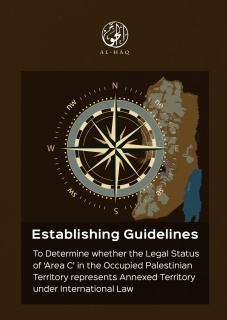
Al-Haq has published a new report “Establishing Guidelines to Determine whether the Legal Status of ‘Area C’ in the Occupied Palestinian Territory represents Annexed Territory under International Law”, which provides a practical set of guidelines to determine when the administration of occupied territory, veers into unlawful de facto annexation. The report plugs a gap in the discourse on occupation law, uniquely charting the situation between general violations of international humanitarian law and violations of occupation law amounting to an animus to annex the territory, showcased through an analysis of seven comparative case examples that involve situations of “occu-annexation”; namely, Crimea, Georgia, East Jerusalem, the occupied Syrian Golan, East Timor, Western Sahara and Northern Cyprus.
The 1995 Israeli-Palestinian Interim Agreement on the West Bank and the Gaza Strip (Oslo II) divided the West Bank into three Areas: Area A includes those parts of the West Bank that are under full Palestinian civil and security control; Area B includes those parts of the West Bank that are under full Palestinian civil control and joint Israeli-Palestinian security control; Area C includes those parts of the West Bank that are under full Israeli civil and military control, including land registration, planning, building and designation of land use. Area C, which comprises more than 61 per cent of the West Bank, contains the bulk of Palestinian agricultural and grazing land, water sources and underground reservoirs.
This report identifies a non-exhaustive set of Guidelines outlining criteria that might indicate de jure or de factoannexation of Area C of the West Bank. It further examines the application of those Guidelines to the situation in Area C in order to assess whether and to what extent Area C has been annexed by Israel.
While belligerent occupation is not prohibited under international law provided that it is temporary and that it does not lead to the forcible acquisition of territory through annexation, the report distinguishes the legal situation of occupation, where an Occupying Power acts within its administrative powers and in accordance with the laws of occupation, from the illegal exercise of sovereignty over the occupied territory. In so doing, the report proposes a number of “Annexation Guidelines” that may indicate when territory has been annexed. The report concludes with questions on whether and to what extent Area C has been annexed by Israel.

